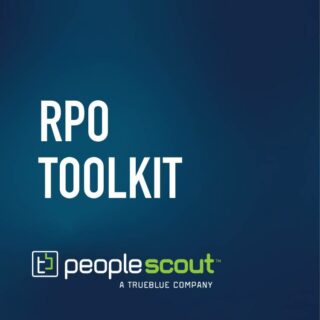In our competitive labour market, many organisations are looking for support as they struggle to attract and hire the talent they need to remain productive and competitive. There are a lot of staffing service providers out there, and it can be difficult to understand which model best aligns with your recruitment goals to ensure you get the results you need. Two options that many organisations choose between are recruitment process outsourcing (RPO) or a traditional recruitment or staffing agency model.
So, what is the difference between a staffing agency and an RPO solutions provider? In this, article we’ll cover the major differences between RPO and direct-hire staffing agencies and how to know what’s best for your global talent acquisition program.
RPO vs Staffing Agencies: Which Recruitment Model is Right for You?
Recruitment process outsourcing (RPO) is a type of business process outsourcing in which an employer transfers delivery of some or all portions of the recruitment process to an external service provider. RPO is a long-term partnership that helps you evolve your talent acquisition strategy to attract and retain high-quality talent to meet your business goals. Outsourcing through an RPO lets you scale up or down during high and low volume periods. RPO recruitment could cover everything from high-volume hiring to niche roles and can be regional or cover your global hiring requirements.
Staffing agencies focus on finding candidates for a specific vacancy. They can be a good option for when in-house teams need a bit of support, especially for low-volume recruitment or one-off staffing for roles. Some staffing agencies may also specialise in temporary, temp-to-hire or contract roles.
Main Differences Between RPO and Recruitment Agency Staffing Process
1. Partnership
Your RPO team acts as an extension of your in-house team and your strategic partner in creating a talent acquisition programme. RPO recruiters may sit on-site, work remotely, work offshore or a combination, and they’ll usually take on your company name and email domain in their communications. An RPO partner will come to understand your business deeply, which means they are best suited to help you evolve your talent acquisition programme to meet your needs now and scale into the future. By accumulating knowledge of your organisation over time, an RPO partner develops efficient processes and brings a strong, consistent representation of your employer brand to all the markets where you’re hiring.
Agency recruiters typically act as a finder—sourcing, pre-screening and introducing candidates to the client (often the hiring manager) who takes it from there. Agency recruiters keep their own company email and brand when interacting with candidates.
2. Staffing Process Improvements
An RPO partner will look at your current recruitment processes across all regions, identify efficiencies and make recommendations based on best practice. Not only does this reduce time-to-fill, but it also improves the candidate experience as candidates increasingly crave timely feedback and clear next steps. A process evaluation will also include your talent technology. Your RPO partner will assess for any gaps, make recommendations for new solutions and support the implementation process.
For a staffing agency, the hire-by-hire nature of their work means they’re often not looking for ways to improve your overall staffing processes.
3. Talent Pooling
One huge advantage of the long-term relationship you build with an RPO partner is taking advantage of their ability to create talent pools. Having a pool of active and passive candidates speeds up time-to-hire by giving you access to a pool of qualified candidates when a new vacancy opens.
Agencies focus on finding candidates for a specific vacancy. It tends to be a reactive model, in which they work from requisition to requisition. Agency recruiters maintain a pool of candidates, but these candidates are not necessarily found with your company in mind.
4. Quality of Hire
Both a staffing agency and RPO will vet candidates—including screening résumés or CVs and conducting initial screenings or first round interviews—before involving your hiring manager.
Leading RPO providers also offer talent assessment solutions to ensure you identify high-performing candidates with the right skills and experience for the role. An assessment solution includes the design and administration of the assessments, which is done in a bias-free way, so only the best, most diverse candidates pass to the interview stage.
With a staffing agency, you’ll use the assessments you already have in place. They generally won’t be responsible for administering them or advise on how to improve them.
5. Talent Advisory Consulting
RPO partners bring added value through their expertise in talent advisory, including employer branding, recruitment marketing, candidate communications, assessment services, labor market insights, workforce planning and talent acquisition strategy. These capabilities are vital for positioning your organization to efficiently attract, recruit and retain top talent in today’s competitive hiring landscape.
Staffing agencies usually post job ads and promote your vacancies under their own employer brand and use their own recruitment marketing tools and techniques. In addition, most lack the expertise to provide talent advisory consulting.
6. Technology Consulting
RPO partners increasingly offer tech consulting and can show you how emerging technologies like artificial intelligence, machine learning and predictive analytics can boost your ability to attract top talent. Some RPO providers offer some kind of recruitment technology component, whether it’s a propriety system or expertise in a variety of talent technology systems. They’ll be comfortable working with your existing systems and can consult on the right tools to help you meet your recruitment goals.
Agencies likely won’t offer technology consulting. Since many of these engagements are short-term in nature, most employers aren’t comfortable giving access to their recruitment technology, and these activities remain in the hands of in-house teams and hiring managers.
7. Reporting and Analytics
As a result of taking over your talent acquisition programme, your RPO partner will assume responsibility for your recruitment results. They’ll work with you to define metrics, KPIs and SLAs, and report on them quarterly. This could include time-to-hire, cost-per-hire, source-of-hire, candidate or hiring manager satisfaction and retention levels.
Forward-thinking RPO providers leverage tech-enabled dashboards that show open requisitions, time-in-step metrics and more. Plus, these interactive reports let you slice and dice the data by recruiter, location, role, candidate NPS, etc. You can also break down your DE&I metrics to understand more about your candidates and those who receive offers.
In addition, leading RPO partners are well-versed in labour market analytics which can help you understand the available talent pool in the locations in which you’re hiring and recommendations on how to adjust your strategy.
Agencies generally won’t supply reporting since their responsibility is to fill individual positions.
Blending RPO and Staffing Agencies with Total Workforce Solutions
While RPO offers many great benefits for permanent recruitment, it may still make sense to use staffing agencies in some cases, especially if you have a need for contingency workers. Moving to an RPO recruitment model doesn’t mean you have to give up agencies altogether. Many RPO providers offer total workforce solutions (TWS) that combine RPO and managed service provider (MSP) solutions.
In an MSP program, your partner will take responsibility for sourcing and engaging your contingent workforce. They’ll also manage the programme administration, including supplying a Vendor Management System (VMS), reporting on contingent worker spend, managing agencies, invoicing, executing compliance checks and more.
Integrating talent acquisition for permanent and contingent workforces under one delivery team through TWS not only helps reduce your agency spend, but it also ensures a consistent experience throughout for hiring managers, HR, procurement, staffing suppliers and candidates alike.
Conclusion
RPO and recruitment agency models serve different needs. By understanding your recruitment objectives now and into the future, you’ll have a clearer understanding of which model is the right choice for your business. You may find that RPO is a perfect option, but that you’ll still engage with agencies for specialist skill sets, contingency workers or certain geographic locations. Total workforce solutions may offer you a holistic approach that combines RPO recruitment and management of your agencies and contingent workforce hiring.




